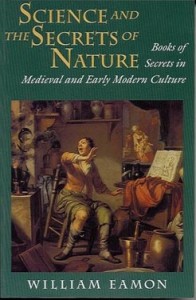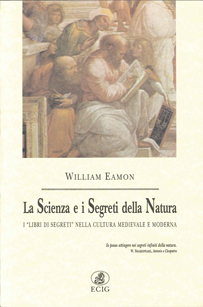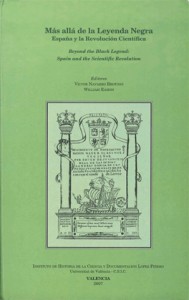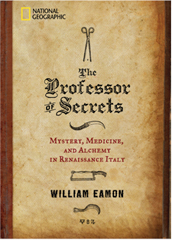Books
Science and the Secrets of Nature:
Books of Secrets in Medieval and Early Modern Culture
(Princeton: Princeton University Press, 1994)
Nominated for a Pulitzer Prize
Winner of the History Book Award, American Publishers Association
 This book offers a new interpretation of the origins of experimental science. In the book, argue that the ‘new science’ of the seventeenth century has its roots in the practical activities of artisans, alchemists, and common healers. Through a detailed analysis of the ‘books of secrets’ tradition from antiquity until the end of the seventeenth century, I argue that the advent of printing was a critical moment in the development of modern science. By publishing the ‘secrets’ of craftsmen and experimenters, early modern printers created a body of empirical knowledge that became the basis for the ‘Baconian sciences’ of the seventeenth centuries.
This book offers a new interpretation of the origins of experimental science. In the book, argue that the ‘new science’ of the seventeenth century has its roots in the practical activities of artisans, alchemists, and common healers. Through a detailed analysis of the ‘books of secrets’ tradition from antiquity until the end of the seventeenth century, I argue that the advent of printing was a critical moment in the development of modern science. By publishing the ‘secrets’ of craftsmen and experimenters, early modern printers created a body of empirical knowledge that became the basis for the ‘Baconian sciences’ of the seventeenth centuries.
Science and the Secrets of Nature also offers a new interpretation of the role of popular culture in the origins of science. The book gives describes the rise upon the scene of a new community of experimenters whom contemporaries called the ‘professors of secrets’. In contrast to the traditional scientific community, the university professors, this group included alchemists, natural magicians, pharmacists, distillers, glassmakers, lens grinders, friars, and empirical doctors. They conceived of science not as the explanation of things known, but as a great hunt after unknown secrets of nature. The metaphor of the ‘secrets of nature’ takes on a new meaning under this interpretation, signifying a fundamental shift in the ethos governing natural philosophy. The books of secrets are witnesses to that change.
Italian Translation
La Scienza e i Segreti della Natura:
I “libri di segreti” nella cultura medievale e moderna
Un viaggio affascinante alle radici della scienza moderna
Translated by Renzo Repetti (Milan: ECIG, 1999)
 Con dovizia di articolari, ricchezza di fonti e rigore scientific, l’Autore ripercorre I tortuosi e complessi percorsi che dalla cultura medievale hanno condotto alle modern concezioni della scienza sperimentale, individuando nell’età umanistico-rinascimentale uno tra I periodi più fecondi di tali elaborazioni concettuali. I “libri di segreti”, veri e propri recettari dove sperimentazione e fantasia si incontravano, essoterismo ed esoterismo si fondevano, rappresentano uno dei primi tentativi di divulgazione scientifica e segnano un importante momento di passaggio dalla magia alla scienza.
Con dovizia di articolari, ricchezza di fonti e rigore scientific, l’Autore ripercorre I tortuosi e complessi percorsi che dalla cultura medievale hanno condotto alle modern concezioni della scienza sperimentale, individuando nell’età umanistico-rinascimentale uno tra I periodi più fecondi di tali elaborazioni concettuali. I “libri di segreti”, veri e propri recettari dove sperimentazione e fantasia si incontravano, essoterismo ed esoterismo si fondevano, rappresentano uno dei primi tentativi di divulgazione scientifica e segnano un importante momento di passaggio dalla magia alla scienza.

Beyond the Black Legend: Spain and the Scientific Revolution
Edited by Victor Navarro Brotóns and William Eamon
(Valencia: Instituto de Historia de la Ciencia y Documentación, 2007)
 The history of the Scientific Revolution that originated modern science has been written, for the most part, from the perspective of the North Atlantic world: England, France, and Holland take center stage, while developments in Germany and Italy follow close behind. The great heroes of the Scientific Revolution—Copernicus, Kepler, Galileo, Huygens, Boyle, Newton, and so on—are all northern Europeans.
The history of the Scientific Revolution that originated modern science has been written, for the most part, from the perspective of the North Atlantic world: England, France, and Holland take center stage, while developments in Germany and Italy follow close behind. The great heroes of the Scientific Revolution—Copernicus, Kepler, Galileo, Huygens, Boyle, Newton, and so on—are all northern Europeans.
The Iberian world, on the other hand, has been almost completely absent from the traditional narrative, despite the fact that over the last thirty years an immense amount of research has been generated (mostly in Spain and Portugal) on the subject of Iberian science. The current narrative of the Scientific Revolution is so biased in this respect that the conclusion seems inescapable that Spain’s absence from the narrative reflects a prejudice whose origins go back to the Black Legend, a polemic that since the eighteenth century has depicted Iberia as the antithesis of modernity.
Yet, when one considers that Spain in the early modern era possessed the world’s greatest empire and that its monarchy was the most powerful in Europe, it is at least counter-intuitive that it should have played little or no role in the period’s greatest cultural movement. At a time when the very term ‘Scientific Revolution’ is being contested, such old stereotypes, which have long stood in the way of a true account of modern history, are in need of being expurgated, once and for all.
Spain’s contribution (or lack thereof) to the history of modern science has been debated at least since the eighteenth century, when, in 1782, the French philosopher Nicholas Masson de Morvilliers fired the first salvo in what has become known as the “polemic of Spanish science.” During the next century-and-a-half, including the period leading up to the Civil War, the debate was dominated by polarized and sterile polemics, one side condemning Spain for its backwardness and ignorance and the other side patriotically defending the ‘Spanish character’. Throughout much of the twentieth century, largely because of Spain’s isolation under the Franco dictatorship, the history of Spanish science was virtually invisible to the outside. Thus, as the concept of the ‘Scientific Revolution’ was being constructed by historians such as I.B. Cohen, A.R. Hall, and Herbert Butterfield, Spain was culturally isolated from the rest of Europe and its history largely ignored.
Más allá de la Leyenda Negra: España y la Revolución Scientifica addresses this urgent historical question. The papers collected in the volume were presented at an international conference held in Valencia in September 2005. The conference’s aim, as our title implies, was to move the historiography of the Scientific Revolution “beyond the Black Legend” and to encourage a more balanced assessment of Iberia’s role in the history of early modern science. More than that, the conference aimed to test and challenge current interpretations of the Scientific Revolution, and to pose the more fundamental question of whether or not an account of the ‘Scientific Revolution’ and the origins of modernity that omits Iberian science can have any meaning at all.
 This book offers a new interpretation of the origins of experimental science. In the book, argue that the ‘new science’ of the seventeenth century has its roots in the practical activities of artisans, alchemists, and common healers. Through a detailed analysis of the ‘books of secrets’ tradition from antiquity until the end of the seventeenth century, I argue that the advent of printing was a critical moment in the development of modern science. By publishing the ‘secrets’ of craftsmen and experimenters, early modern printers created a body of empirical knowledge that became the basis for the ‘Baconian sciences’ of the seventeenth centuries.
This book offers a new interpretation of the origins of experimental science. In the book, argue that the ‘new science’ of the seventeenth century has its roots in the practical activities of artisans, alchemists, and common healers. Through a detailed analysis of the ‘books of secrets’ tradition from antiquity until the end of the seventeenth century, I argue that the advent of printing was a critical moment in the development of modern science. By publishing the ‘secrets’ of craftsmen and experimenters, early modern printers created a body of empirical knowledge that became the basis for the ‘Baconian sciences’ of the seventeenth centuries. 
 Con dovizia di articolari, ricchezza di fonti e rigore scientific, l’Autore ripercorre I tortuosi e complessi percorsi che dalla cultura medievale hanno condotto alle modern concezioni della scienza sperimentale, individuando nell’età umanistico-rinascimentale uno tra I periodi più fecondi di tali elaborazioni concettuali. I “libri di segreti”, veri e propri recettari dove sperimentazione e fantasia si incontravano, essoterismo ed esoterismo si fondevano, rappresentano uno dei primi tentativi di divulgazione scientifica e segnano un importante momento di passaggio dalla magia alla scienza.
Con dovizia di articolari, ricchezza di fonti e rigore scientific, l’Autore ripercorre I tortuosi e complessi percorsi che dalla cultura medievale hanno condotto alle modern concezioni della scienza sperimentale, individuando nell’età umanistico-rinascimentale uno tra I periodi più fecondi di tali elaborazioni concettuali. I “libri di segreti”, veri e propri recettari dove sperimentazione e fantasia si incontravano, essoterismo ed esoterismo si fondevano, rappresentano uno dei primi tentativi di divulgazione scientifica e segnano un importante momento di passaggio dalla magia alla scienza. The history of the Scientific Revolution that originated modern science has been written, for the most part, from the perspective of the North Atlantic world: England, France, and Holland take center stage, while developments in Germany and Italy follow close behind. The great heroes of the Scientific Revolution—Copernicus, Kepler, Galileo, Huygens, Boyle, Newton, and so on—are all northern Europeans.
The history of the Scientific Revolution that originated modern science has been written, for the most part, from the perspective of the North Atlantic world: England, France, and Holland take center stage, while developments in Germany and Italy follow close behind. The great heroes of the Scientific Revolution—Copernicus, Kepler, Galileo, Huygens, Boyle, Newton, and so on—are all northern Europeans. SET AGAINST THE SUMPTUOUS BACKDROP
of Renaissance Italy, this riveting tale explores the era’s medicine and culture through the life of the world’s first "celebrity doctor"—whose miracle cures and outsize personality drew both adoration and scorn.
The Professor of Secrets was Leonardo Fioravanti, a brilliant, forward-thinking, and utterly unconventional doctor... His marvelous remedies and talent for self-aggrandizement earned him the adoration of the people, the derision of the medical establishment, and a reputation as one of his era’s most colorful and combative figures.
SET AGAINST THE SUMPTUOUS BACKDROP
of Renaissance Italy, this riveting tale explores the era’s medicine and culture through the life of the world’s first "celebrity doctor"—whose miracle cures and outsize personality drew both adoration and scorn.
The Professor of Secrets was Leonardo Fioravanti, a brilliant, forward-thinking, and utterly unconventional doctor... His marvelous remedies and talent for self-aggrandizement earned him the adoration of the people, the derision of the medical establishment, and a reputation as one of his era’s most colorful and combative figures.





